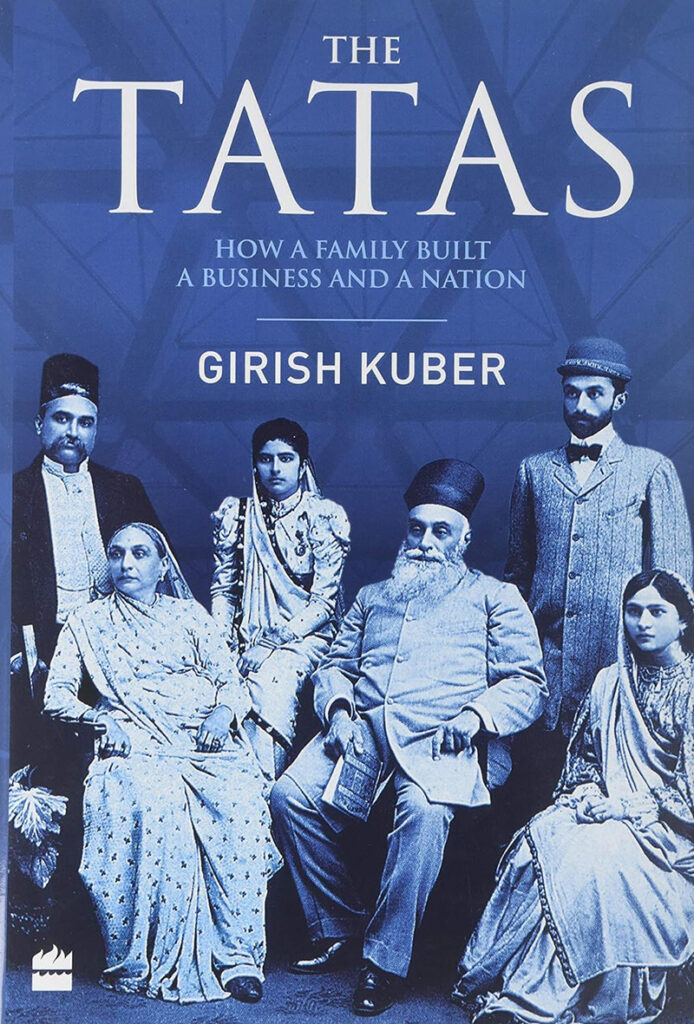
From the moment I picked up Girish Kuber’s “The Tatas: How a Family Built a Business and a Nation,” I knew I was about to embark on a journey through the annals of one of India’s most storied business families. The book chronicles the saga of the Tata family, from the entrepreneurial beginnings of Nusserwanji Tata in the early 19th century to the contemporary leadership of Natrajan Chandrasekaran, painting a vivid portrait of not just a family’s legacy but also the parallel evolution of a nation.
One of the most striking aspects of Kuber’s narrative is his ability to intertwine the Tata family’s story with the broader socio-economic fabric of India. The book adeptly illustrates how the Tatas’ business acumen and ethical practices were instrumental in shaping India’s industrial landscape. A quote that resonated with me was: “In the Tatas’ ethos, the wealth of the nation was as important as the wealth of the company.” This sentiment echoes throughout the book, reinforcing the Tata ethos of prioritizing social welfare alongside business success.
Kuber’s portrayal of the Tata patriarchs is both informative and inspiring. The journey from Nusserwanji’s humble beginnings to the global expansion under leaders like JRD and Ratan Tata is depicted with a mix of admiration and critical analysis. The narrative is not just a chronology of events; it’s a collage of entrepreneurial spirit, visionary leadership, and ethical decision-making.
However, the book is not without its biases. In its later chapters, particularly in the portrayal of contemporary times, there is a discernible tilt towards a more flattering depiction. Another quote that captures this tone is: “In the world of business where the lines of ethics are often blurred, the Tatas stood as a beacon of unwavering integrity.” While this underscores the widely held perception of the Tata Group, a more nuanced exploration of the challenges and controversies would have added depth to the narrative.
The book’s greatest strength lies in its ability to humanize the figures behind the Tata empire. The inclusion of personal anecdotes and lesser-known facts about the Tata family members adds layers to the narrative, making it more relatable and engaging.
In terms of take-home messages, the book reinforced the belief that ethical business practices and societal contributions are not just altruistic choices but can also be key drivers of long-term success. The Tata story is a testament to the idea that businesses can indeed play a crucial role in nation-building. Hereby are key take home messages from the book:
- People-Centric Approach: The Tata Group’s philosophy of putting people first, treating every employee from janitors to CEOs with equal respect, is a testament to their values and leadership style. This approach likely plays a significant role in their ability to build a loyal and dedicated workforce.
- Innovation and Forward Thinking: The Tatas’ ability to stay ahead in business decisions, often being pioneers in their field, reflects their innovative mindset. This forward-thinking approach has kept them relevant and successful across generations.
- Ethical Business Practices: Their emphasis on ethical practices and not just focusing on profit is a key differentiator. The Tata Group’s commitment to integrity and trust is a cornerstone of their business model, making them a trusted name among investors and the broader community.
- Generational Legacy and Vision: The continuity of vision and passion for business from the founder, Jamsetji Tata, to the current leadership is remarkable. It’s unusual for a family business to maintain such consistency in vision and values over generations.
- Philanthropy and Community Contribution: The Tata Group’s extensive contributions to various societal and community projects reflect their commitment to social responsibility. This aspect of their business philosophy has earned them immense respect and admiration.
- Visionary Leadership: The Tata Group’s visionary approach, which played a pivotal role in shaping the economy of post-independent India, is a significant aspect of their legacy. Their ability to think ahead of their time and invest in long-term projects has been crucial.
- Resilience in Political Turbulence: Your mention of the Tata Group’s resilience in the face of political crises underscores their ability to navigate complex environments without compromising their principles.
- Social Wealth as a Core Philosophy: The Tata Group’s focus on generating social wealth, rather than considering it a byproduct of business success, sets them apart. This approach is exemplified in their early adoption of CSR (Corporate Social Responsibility) practices, long before it became a mandated or popular concept.
- Contributions to Education and Research: The establishment of institutions like the Indian Institute of Science (IISc), Tata Institute of Social Sciences (TISS), Tata Institute of Fundamental Research (TIFR), and numerous trusts, reflect the Group’s deep commitment to education and research.
Overall, “The Tatas” by Girish Kuber is more than just a business biography; it’s a mosaic of history, ethics, and visionary leadership. While it tends to glorify the Tata Group, particularly in the contemporary context, it remains an essential read for anyone interested in understanding the interplay between business and society in the context of Indian history.
Prof. Dr. Prahlada N. B
16 December 2023
Chitradurga.



















Leave a reply